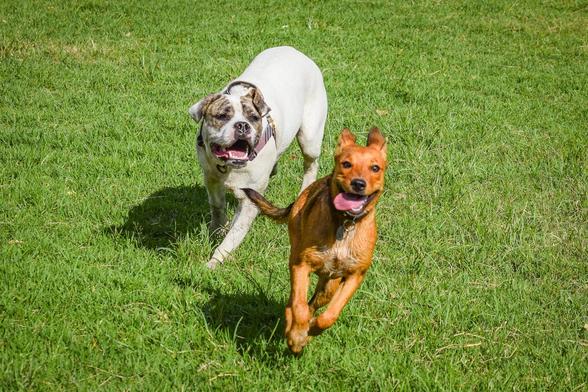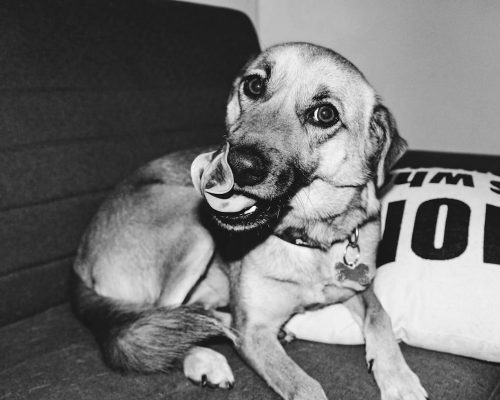Prey drive is the main reason why dogs chase cars. Dogs chasing cars is a widely known behavior that many dog owners struggle to comprehend and control.
Although it may seem like an odd quirk, this behavior is deeply ingrained in your dog’s instincts. Whether it’s due to an innate desire to hunt, a need for stimulation, or territorial tendencies, dogs chase cars for several reasons.
Understanding the underlying causes of this behavior can help you prevent accidents, manage your dog’s instincts, and foster a safer environment for them. This article will uncover the untold truth about why dogs chase cars and how to stop it.
Table of Contents
ToggleThe History Behind the Instinct
Understanding why dogs chase cars requires looking at their evolutionary roots. Dogs are descendants of wolves, and their instincts have been honed over thousands of years. In the wild, wolves would chase moving prey to hunt and feed.
Although domesticated dogs no longer need to hunt, these primal instincts remain. The sight of a moving object, especially something fast like a car, triggers a similar response as if they were chasing prey.
This connection between wild ancestry and modern-day behavior is crucial in understanding why dogs feel the need to chase. It’s a vestige of their survival mechanism, ingrained in their psyche despite centuries of domestication.
Understanding Prey Drive in Dogs
Prey drive is an instinctual behavior that causes dogs to chase after fast-moving objects. It is deeply embedded in a dog’s nature and can be traced back to their wolf ancestors, who relied on chasing for survival.
Prey drive manifests in various ways, such as chasing small animals, toys, or even moving vehicles. For dogs with high prey drives, this chase is often irresistible.
The intensity of a dog’s prey drive varies by breed. Some breeds, such as Greyhounds, Terriers, and Border Collies, have particularly strong prey drives due to their history as hunters or herders.
This drive is linked to the dog’s need for stimulation and exercise. When they see a car speeding by, they instinctively want to chase, believing it is a moving target similar to a prey animal.
Why Moving Objects Trigger Dogs
Dogs’ eyes are adapted to detect motion more effectively than stationary objects. This sensitivity to movement is a key reason why fast-moving cars attract their attention.
Their brains are wired to detect and track moving objects, which is why a car passing by can set off a chase response. This natural reaction is deeply rooted in their prey drive, and while it can be entertaining in the short term, it becomes problematic when dogs start chasing moving vehicles.
The speed and unpredictability of cars trigger an instinctual reaction that dogs struggle to control. The quick motion of a car resembles fleeing prey, which prompts the dog to chase after it.
Territorial Instincts
Dogs are territorial animals, and they instinctively protect their home and the areas they consider their territory. When a car enters their space, they may perceive it as an intruder.
This territorial behavior can manifest as barking, growling, or, in extreme cases, chasing the car to protect their perceived boundaries.
For some dogs, especially those with guarding instincts like German Shepherds, Rottweilers, and Dobermans, the urge to protect their territory is strong.
These dogs often chase cars to ward off what they consider a threat. Even if they’re not in direct danger, their protective instincts drive them to take action.
Predatory Chase Instinct
Dogs’ predatory chase instinct is an automatic reaction that is triggered when they spot a moving object. This instinct is more pronounced in certain breeds, but it is present in all dogs to some degree. When a dog sees a car, the motion of the vehicle mimics the behavior of prey, and the dog’s instinct is to chase it.
While chasing cars is dangerous and unnecessary, this instinct is deeply rooted in the survival mechanisms of dogs’ ancestors.
In the wild, dogs relied on their speed and agility to catch fast-moving prey. This ancestral trait remains alive today, even though dogs are no longer chasing animals to feed themselves.
Lack of Physical and Mental Stimulation
Boredom is one of the primary reasons dogs engage in behaviors like car chasing. Dogs are energetic animals that require both physical and mental stimulation to stay happy and healthy.
If a dog is left in the yard with minimal exercise or mental challenges, it may resort to chasing cars as a way to release excess energy.
Mental stimulation is just as important as physical exercise for dogs. Activities like puzzle toys, obedience training, and interactive games help keep their minds active. Without these outlets, dogs may seek stimulation in other, less desirable ways, such as chasing cars.
Anxiety and Stress as Triggers
Anxiety and stress can exacerbate any behavior, and car chasing is no exception. Dogs that are anxious or stressed may engage in behaviors like pacing, barking, or car chasing. Stressors such as loud noises, unfamiliar environments, or separation anxiety can trigger these behaviors.
If your dog has been previously involved in a car chase incident or has witnessed a stressful event involving cars, this could become a trigger.
Over time, your dog may associate the presence of a car with the anxiety it experiences, causing them to chase in an attempt to alleviate their stress.
The Thrill of the Chase
For many dogs, the act of chasing is thrilling. The adrenaline rush from pursuing something fast and unpredictable is highly stimulating.
Even though it’s dangerous and unwanted, car chasing can become addictive for dogs, especially if they have learned to associate the behavior with positive outcomes, such as the thrill of the chase itself.
The satisfaction dogs get from the chase can reinforce the behavior, making it harder to break. This self-rewarding cycle can perpetuate the issue, leading the dog to chase cars whenever they see them.
Reinforcement of the Behavior
Unintentionally, dog owners can reinforce car-chasing behavior. If a dog is allowed to chase cars or if the owner responds with laughter or encouragement, the behavior can become stronger.
Dogs often repeat actions that yield positive results, and chasing cars can become a fun game for them if it’s not corrected.
Reinforcement doesn’t always come from praise or direct involvement. Simply allowing the behavior to continue without correction sends a message to the dog that it’s acceptable. This reinforces the idea that chasing cars is an appropriate reaction.
Breed-Specific Tendencies
Certain breeds are more likely to chase cars due to their history and genetic predisposition. Dogs bred for hunting, such as Greyhounds, Beagles, and Jack Russell Terriers, tend to have a high prey drive, which makes them more prone to chasing moving objects.
Similarly, herding breeds like Border Collies and Australian Shepherds may chase cars as a way to “herd” them, believing they are rounding up a stray herd.
It’s important to understand your dog’s breed and its natural tendencies. If you own a high-energy breed, you’ll need to provide more mental and physical stimulation to prevent behaviors like car chasing.
Puppyhood Habits That Stick
Puppies are naturally curious and playful, and they often engage in behaviors like chasing moving objects. However, without proper training and redirection, these habits can carry over into adulthood.
If a puppy is allowed to chase cars as part of its playtime, it may continue this behavior throughout its life, making it harder to correct as an adult.
Proper socialization and training from an early age are critical to preventing car chasing. Introducing puppies to various environments, situations, and controlled distractions can help them learn appropriate behaviors.
Risks of Car Chasing
Car chasing is not just an annoying habit; it can be extremely dangerous. Dogs that chase cars risk serious injuries or even death.
Running into traffic can result in fatal accidents, and even if the dog isn’t hit, the danger of getting caught between moving vehicles remains high.
Additionally, dogs that engage in frequent car chasing may develop anxiety or stress-related issues, which can affect their overall well-being. This behavior can lead to a pattern of fear and aggression toward cars, further complicating the problem.
How to Identify Triggers for Your Dog
Understanding the specific triggers that cause your dog to chase cars is essential in addressing the behavior. Does your dog chase only certain types of cars or vehicles at high speeds?
Does your dog react to sounds, such as engine noise or honking horns? Identifying patterns allows you to pinpoint the triggers and create an effective strategy for correction.
Tracking when and where the behavior occurs can help you create a plan for managing your dog’s response to cars and other moving objects.
Effective Training Techniques to Stop Car Chasing
Training is the most effective way to stop car chasing behavior. Positive reinforcement techniques, such as rewarding your dog for calm behavior and redirecting attention, can be powerful tools in breaking the habit. Training commands like “sit,” “stay,” and “leave it” can help control the dog’s impulse to chase.
Consistency is key to successful training. Reward your dog when it refrains from chasing cars and remain calm and patient during the process.
Tools to Prevent Car Chasing
Sometimes training alone isn’t enough to prevent a dog from chasing cars. Tools like leashes, harnesses, and fences can provide additional control.
A leash or long lead during walks can prevent your dog from darting into traffic. Secure fences around your property can keep your dog contained and away from roads.
For particularly stubborn dogs, training collars or containment systems like electric fences can help manage the behavior. Always consult a professional before using these tools to ensure they’re used correctly and safely.
Engaging Your Dog to Prevent Chasing
A dog that is regularly exercised and mentally stimulated is less likely to engage in undesirable behaviors like car chasing. Regular walks, runs, and play sessions can help burn off excess energy.
Additionally, mentally stimulating activities such as puzzle toys, obedience training, and interactive games can keep your dog’s mind occupied.
Ensuring that your dog’s needs are met through structured physical and mental challenges can significantly reduce the urge to chase moving objects.
Working with a Professional Trainer
If your dog’s car-chasing behavior is persistent or particularly dangerous, it may be time to seek professional help. A professional dog trainer or canine behaviorist can assess the situation and develop a customized plan for your dog’s specific needs.
Working with an expert can provide faster, more reliable results and help address deeper behavioral issues. A professional trainer can also provide guidance on how to work through specific triggers and help create an environment that reduces the chances of car chasing in the future.
Safe Alternatives to Channel Prey Drive
Dogs with high prey drives need appropriate outlets to safely channel their instincts. Structured games like fetch, tug-of-war, and agility courses provide mental and physical challenges that simulate the chase without the dangers associated with moving cars.
Additionally, activities like lure coursing, where dogs chase a moving object in a controlled setting, are excellent ways to engage their prey drive safely. By providing these safe alternatives, you can redirect your dog’s natural instincts while keeping them safe and happy.
Conclusion
Understanding why dogs chase cars is key to stopping the behavior. From prey drive and territorial instincts to boredom and stress, the causes are complex and multifaceted.
However, with the right training, stimulation, and prevention strategies, you can help your dog break the habit of chasing cars and create a safer environment for both you and your furry friend.
By fostering a deeper understanding of your dog’s behavior and using effective techniques to manage it, you can prevent accidents, reduce stress, and enjoy a more harmonious relationship with your pet.






